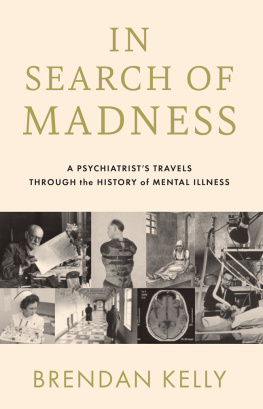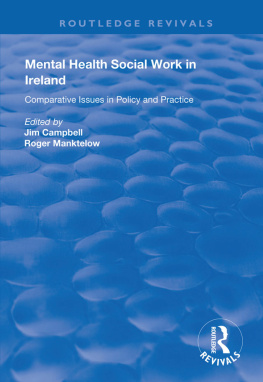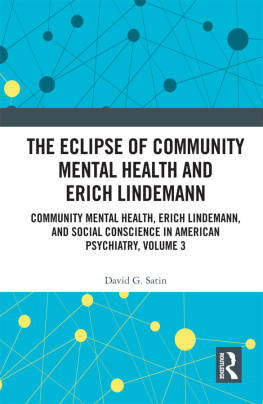HEARING
VOICES This book is dedicated to Meabh
HEARING
VOICES
THE HISTORY OF PSYCHIATRY
IN IRELAND
Brendan Kelly
Published in 2016 by
Irish Academic Press
10 Georges Street
Newbridge
Co. Kildare
Ireland
www.iap.ie
2016 Brendan Kelly
ISBN: 978-1-911024-34-7 (Cloth)
ISBN: 978-1-911024-42-2 (Kindle)
ISBN: 978-1-911024-43-9 (PDF)
ISBN: 978-1-911024-44-6 (Epub)
British Library Cataloguing in Publication Data
An entry can be found on request
Library of Congress Cataloging in Publication Data
An entry can be found on request
All rights reserved. Without limiting the rights under copyright
reserved alone, no part of this publication may be reproduced, stored
in or introduced into a retrieval system, or transmitted, in any form
or by any means (electronic, mechanical, photocopying, recording or
otherwise) without the prior written permission of both the copyright
owner and the above publisher of this book.
Design by www.jminfotechindia.com
Typeset in Garamond Premier Pro 10.5/14 pt
Cover design by www.phoenix-graphicdesign.com
Front jacket image: Courtesy of na Spain with permission from the HSE.
Back jacket image: St Itas Hospital, Portrane (1900). Source: Building News and Engineering Journal (78, 2364, 27 April 1900, pp. 5723). Courtesy of the Irish Architectural Archive.
Printed and bound in Great Britain by TJ International Ltd.
A BBREVIATIONS
ADHD Attention deficit hyperactivity disorder
APA American Psychiatric Association
BILD British Institute of Learning Disabilities
CMH Central Mental Hospital
CRPD Convention on the Rights of Persons with Disabilities
DBS Deep brain stimulation
DETECT Dublin and East Treatment and Early Care Team
DPM Diploma in Psychological Medicine
DSM Diagnostic and Statistical Manual of Mental Disorders
ECHR European Convention on Human Rights
ECT Electroconvulsive therapy
EEC European Economic Community
EU European Union
GLEN Gay and Lesbian Equality Network
GNC General Nursing Council
GNP Gross national product
GP General practitioner
GPI General paralysis of the insane
HSE Health Service Executive
IMG Independent Monitoring Group
IRA Irish Republican Army
KC Kings Counsel
LGB Lesbian, gay and bisexual
LGBT Lesbian, gay, bisexual and transgender
LSD Lysergic acid diethylamide
MB Medicinae Baccalaureus (Latin; Bachelor of Medicine)
MD Medicinae Doctor (Latin; Doctor of Medicine)
MHID Mental health of intellectual disability
MP Member of Parliament
MPA Medico-Psychological Association
MPhil Masters in philosophy
NCHD Non-consultant hospital doctor
NHS National Health Service
NICE National Institute for Clinical Excellence
NOSP National Office for Suicide Prevention
NSW New South Wales
OCD Obsessive compulsive disorder
OECD Organisation for Economic Co-operation and Development
PTSD Post-traumatic stress disorder
RCSI Royal College of Surgeons in Ireland
RIC Royal Irish Constabulary
RMPA Royal Medico-Psychological Association
RMS Resident Medical Superintendent
RTA Road traffic accident
RT Raidi Teilifs ireann
SJ Society of Jesus
TB Tuberculosis
TD Teachta Dla
UCC University College Cork
UCD University College Dublin
UK United Kingdom
UN United Nations
US United States
WHO World Health Organisation
F OREWORD
O f the many national histories of psychiatry, Brendan Kellys well-researched and compellingly written history of Irish psychiatry leads the pack. This is the first comprehensive history of psychiatry in Ireland.
Kelly, who is an historian as well as the Professor of Psychiatry at Trinity College, Dublin, shares the historians preference for primary sources, often unpublished, in order to let the people of the time speak for themselves. And here, in a story that begins in 1745 with author Jonathan Swift providing in his will for the establishment of a proper hospital for the mentally ill, the psychiatrists of the day as well as the patients find their voices heard loudly and clearly.
Kellys main theme is that the asylums were primarily social creations, reflecting social and political change far more than they ever reflected changes in the practice of medicine and psychiatry. The story is driven for the most part by changes in the real world, such as the Famine, rather than by internal motors such as the introduction of new concepts or medications though Kelly gives the internalist moments their full due.
This is not antipsychiatry history at all, in which we learn that there is no such thing as mental illness and that the physicians were mainly intent upon increasing their power. Kelly, himself a senior figure, respects the magnitude of the therapeutic power that psychiatry often brings to bear, and ventilates fully the sufferings of the patients in the hope that future patients who encounter this work might bear away some measure of encouragement.
Ireland in the nineteenth century groaned under often unimaginable poverty, and Kelly notes that, the asylums functioned as a vast, unwieldy social welfare system for patients and possibly some staff. Before the 1960s, in other words, psychological medicine was centred in asylums, and this, says Kelly, left an indelible stain on Irish psychiatry as the psychiatry of confinement.
The central issue in the Irish history, Kelly argues, is not why the rate of mental illness was higher in Ireland than elsewhere (Kelly definitively shows it was not). Rather, the big question is why Irelands asylums were larger in size and slower to decrease in size than elsewhere. The answer lies in a society that has an apparently insatiable hunger for institutionalization. This would be an Irish theme, there was no comparable hunger in Italy, for example.
Yet Irish psychiatry reflects other themes that are global in scope. It was true in many lands that admission to an asylum in the nineteenth century could be a death warrant, because tuberculosis (TB) was endemic and spread easily from patient to patient. Kelly finds that 16 per cent of the Irish general population died of TB, 25 per cent of the asylum population.
Everywhere in the nineteenth century, insanity was thought to be increasing. Yet the consensus among historians of other countries was that it was not. Kelly finds an increase unlikely for Ireland as well. What did change was the presentation, or ascertainment, of mental disorder, which shifted from what we now call intellectual disability (formerly, idiots) to psychotic disorder (formerly, lunatics). Moreover, the Famine may have tipped mentally precarious individuals into outright insanity, thus increasing the rate for a short time. What makes the notion of a long-term increase in mental illness unlikely is that the major disorders in psychiatry are heavily influenced by genetics, and genetic factors are unlikely to change much over time. Was there more stress in modern urban life than previously? Every generation lives with the idea that it is more subject to stress than the previous generation. This belief is likely a constant in the human condition.
















